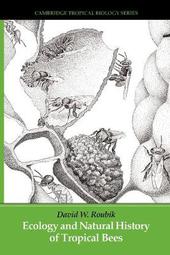
|
Ecology and Natural History of Tropical Bees
Paperback / softback
Main Details
| Title |
Ecology and Natural History of Tropical Bees
|
| Authors and Contributors |
Edited by David W. Roubik
|
| Series | Cambridge Tropical Biology Series |
|---|
| Physical Properties |
| Format:Paperback / softback | | Pages:526 | | Dimensions(mm): Height 228,Width 152 |
|
| Category/Genre | Insects |
|---|
| ISBN/Barcode |
9780521429092
|
| Classifications | Dewey:595.799045 |
|---|
| Audience | | Professional & Vocational | |
|---|
| Illustrations |
61 Halftones, unspecified; 6 Line drawings, unspecified
|
|
Publishing Details |
| Publisher |
Cambridge University Press
|
| Imprint |
Cambridge University Press
|
| Publication Date |
29 May 1992 |
| Publication Country |
United Kingdom
|
Description
Humans have been fascinated by bees for centuries. Bees display a wide spectrum of behaviours and ecological roles that have provided biologists with a vast amount of material for study. Among the types observed are both social and solitary bees, those that either pollinate or destroy flowers, and those that display traits allowing them to survive underwater. Others fly mainly at night, and some build their nests either in the ground or in the tallest rain forest trees. This highly acclaimed book summarises and interprets research from around the world on tropical bee diversity and draws together major themes in ecology, natural history and evolution. The numerous photographs and line illustrations, and the large reference section, qualify this book as a field guide and reference for workers in tropical and temperate research. The fascinating ecology and natural history of these bees will also provide absorbing reading for other ecologists and naturalists.
Reviews'It will be valued for its substantial and wide-ranging bibliography, as well as for the text, which is a carefully organised mosaic of sparkling fragments giving tempting glimpses of a relatively unexplored world.' Trends in Ecology and Evolution ' ... it should be on the shelves of anyone interested in bees, insects or the ecology of the tropics.' New Scientist
|